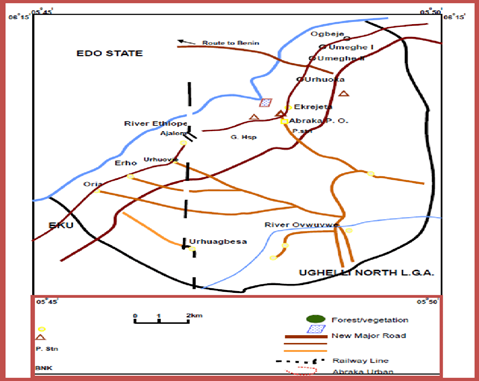An Assessment of Soil Physicochemical and Trace Metal Profiles around Welding Fabrication Areas of Abraka, Delta State, Nigeria
DOI:
https://doi.org/10.70882/josrar.2025.v2i4.114Keywords:
Welding activities, Metals, Soil physicochemical propertiesAbstract
This study assessed the physicochemical and trace metal profiles of soils around from welding fabrication areas in Abraka, Delta state, Nigeria. Soil samples were collected from a welding (contaminated site) and a control site. Standard laboratory methods (APHA) and (AOAC) were used to analysed soil parameters and metal concentrations, with results compared against World Health Organization (WHO) limits. The welding-affected soils exhibited higher electrical conductivity and organic matter but lower bulk density content compared to the control site, suggesting better water retention in less-disturbed soils. Moisture content was notably higher in the control soil, suggesting better retention in undisturbed soils. Soil temperature, pH, and water holding capacity also varied between sites. Chemical analysis revealed lower calcium in the contaminated soil but higher magnesium and nitrogen, while phosphorous was reduced relative to the control, all within WHO acceptable ranges. Trace metal analysis showed extremely high levels of nickel and cadmium in the welding-affected soils, far above WHO limits. Other metals, including zinc, iron, lead, cobalt, manganese, copper, chromium, and arsenic, were also elevated relative to the control, although some remained within acceptable limits. The study concludes that welding activities substantially degrade soil quality and increase metal contamination, recommending periodic monitoring, safer waste management, and community awareness to mitigate impacts.
References
Abdullahi, I., and Musa, A. (2023). Heavy metal contamination of soils around welding workshops in Yobe State, Nigeria. Environmental Monitoring and Assessment, 195(4): 112- 119.
Agbogidi, O. M., Ophedumien, C. O., and Nwabueze, A. A. (2024). Effects of water-soluble fractions of crude oil on physicochemical quality and heavy metal status of River Ethiope at Abraka, Nigeria. Journal of Basics and Applied Sciences Research, 2(2): 46-50.
Agbogidi, O.M., and Ogbe, O. (2025). Performance of cassava (Manihot esculenta Crantz) as affected by crude oil contamination of soil. Journal of Science Research and Reviews, 2(2): 63-69.
Ajeh, E.A., Eze, C.N., and Okafor, C.F. (2022). Geospatial assessment of heavy metal contamination in soils around metal fabrication clusters in Benin City, Nigeria. Heliyon, 8(12): 12056- 12060.
Akoto, O., Nimako, C., and Boakye, D. (2021). Heavy metal accumulation and ecological risk assessment in soils around welding workshops in Kumasi, Ghana. Environmental Monitoring and Assessment, 193(10): 630-642.
Bishnu Angon, P., Islam, M. S., K.S., Das, A., Anjum, N., Poudel, A., and Sushil, S.A. (2024). Sources, effects and present perspectives of heavy metals contamination: Soil, plants and human food chain. Heliyon, 10(7): 1-16.
Das, S., Sultana, K.W., Ndhlala, A. R., Mondal, M., and Chandra, I. (2023). Heavy metal pollution in the environment and its impact: Exploring green technology for remediation. Environmental Health Insights, 17(1): 20-27.
Edori, M., Ahmed, S., and Bello, T. (2021). Physicochemical properties and heavy metal contamination of soils in semi- urban metal workshops. Journal of Environmental Chemistry and Ecotoxicology, 13(2): 45-56.
Musa, M.S., and Abdullahi, S. (2023). Evaluation of heavy metal pollution index in soil around metal workshops in potiskum, Yobe State, Nigeria. Bayero Journal of Pure and Applied Sciences,16(2):36-58.
Nedjimi, B. (2021). Phytoremediation: a sustainable environmental technology for heavy metals decontamination. SN Applied Sciences, 3, 1-19.
Onanuga, A. O., Adewuyi, O.O., and Olalekan, A.P. (2023). Heavy metal pollution and ecological risk assessment of soils in ogijo industrial area, Ogun State, Nigeria. Environmental Science and Pollution Research, 30(14): 39802-39817.
Ozabo, F, and Obaro, H.N. (2016). Health effects of poor waste management in Nigeria: a case study of Abraka in Delta State. International Journal of Environment and Waste Management, 18 (3): 195-204.
Pam, D.D., Samuel, T., and Sule, H. (2024). Potential ecological risk of heavy metal contamination in soils of urban workshops in Jos, Nigerian journal of Environmental Sciences, 18(2): 112-125.
Shah, M., Iqbal, J., and Khan, M. A. (2021). Heavy metal contamination in soils around small-scale metal contamination in soils around small-scale metal workshops: Implications for urban agriculture. Environmental pollution,278: 116-887.
WHO/FAO (2010). World Health Organization (WHO) and Food and Agriculture Organization (FAO). Joint FAO/WHO food standards programme codex alimentarius commission. (10). Rome: FAO/WHO 510 p.
Yan, A., Wang, Y., S. N., Yusuf, M. L. M., Ghosh, S., and Chen, Z. (2020). Phytoremediation: A promising approach for revegetation of heavy metal-polluted land. Frontiers in Plant Science, 11: 1-15.

Downloads
Published
Issue
Section
License
Copyright (c) 2025 Journal of Science Research and Reviews

This work is licensed under a Creative Commons Attribution-NonCommercial 4.0 International License.
- Attribution — You must give appropriate credit, provide a link to the license, and indicate if changes were made. You may do so in any reasonable manner, but not in any way that suggests the licensor endorses you or your use.
- NonCommercial — You may not use the material for commercial purposes.
- No additional restrictions — You may not apply legal terms or technological measures that legally restrict others from doing anything the license permits.




